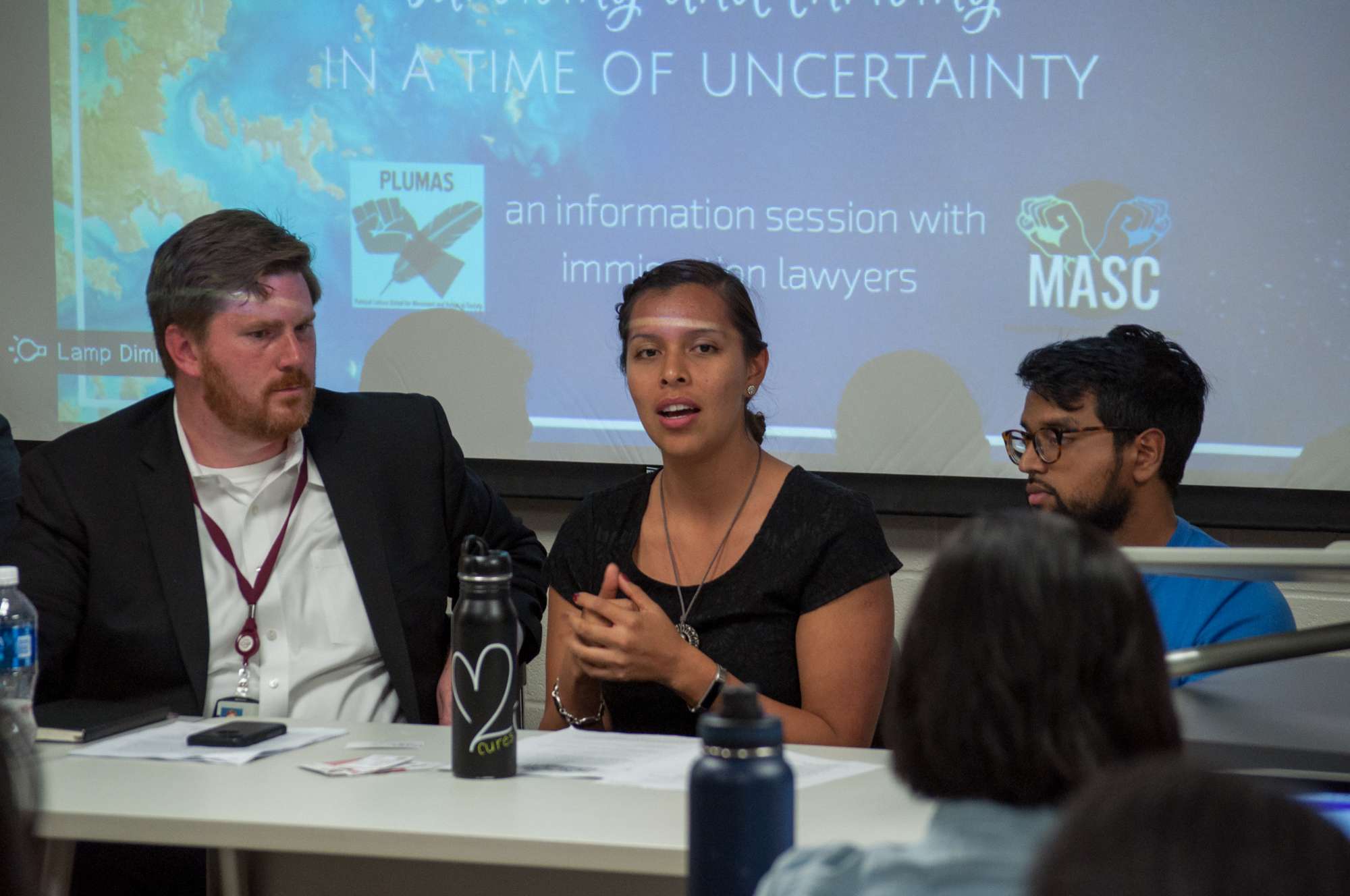As part of the effort to advocate for the University of Maryland’s immigrant community, PLUMAS partnered with the Muslim Alliance for Social Change to hold a workshop about immigration Wednesday in Jimenez Hall.
A panel of lawyers, a CASA representative, a university alumnus and this university’s undocumented student coordinator discussed Temporary Protected Status and the Deferred Action for Childhood Arrivals program, as well as legal procedures for those facing deportation, the DACA renewal process and resources available on the campus.
Political Latinx United for Movement and Action in Society president Madelyne Ventura, a senior mathematics major, said this event was held to ensure “this campus is safe and they are indeed supported by their student peers,” as well as to raise awareness about DACA and President Trump’s new travel ban. The ban will go into effect Oct. 18 and will restrict travel for many citizens of six predominantly Muslim countries, as well as Venezuela and North Korea.
“The people are scared, and they don’t know who to turn to,” Ventura said.
[Read more: UMD PLUMAS is helping DACA students pay fees so they can renew their status]
Initially, PLUMAS and the Muslim Alliance for Social Change were planning to hold separate events to discuss immigration policies but decided to combine them, which led to a larger turnout and showed solidarity, presidents of both organizations said. About 40 people attended the information session.
“Immigration is a big issue within the Muslim community, but it is often something that is not talked about,” said Sarah Eshera, Muslim Alliance for Social Change president and a senior mathematics and philosophy major. “We wanted to bring it to the forefront and have a place where we can talk about [immigration] and people can ask questions.”
The panel included Nick Katz of CASA; Laura Bohorquez, the university’s undocumented student coordinator; lawyers Chika Enekwe and Kaosy Umeh of Enekwe and Umeh Law Center; and alum Yves Gomes, an undocumented immigrant.
In September, Trump announced the end of DACA, which allows some immigrants who came to the United States as young children to work and study in two-year increments.
While the panelists said they were expecting immigration policy changes by the Trump administration, as he did make promises during his campaign trail, they did not expect it to be implemented so quickly.
“I knew [Trump] was going to attack DACA, but I didn’t think he was going to end it,” Enekwe said. “He was quite clear on his campaign about what his intentions will be. The rapid speed that it happened in took me by surprise [but] the action itself was not surprising.”
[Read more: UMD’s undocumented student coordinator sees more requests after Trump’s DACA announcement]
Temporary Protected Status, a program whose fate is uncertain under the Trump administration, protects immigrants from deportation if their home country is not safe to return to. The administration will decide in the next six months whether to extend the status of immigrants from several countries, including Sudan, Haiti and Nicaragua.
Katz said if the program is revoked, it will affect “hundreds of thousands of people across the country and a lot of people right here in the D.C. area.” More than 440,000 people in the United States are covered by the program, according to CNN.
The panelists reassured the attendees that DACA-mented immigrants are allowed to stay in the country until their current permit expires, which can be extended if their renewal is granted. Renewal applications for immigrants whose permit expires on or before March 5 will only be accepted if received by the Homeland Security Department by Thursday.
The panelists also stressed the importance of immigrants receiving legal help and support.
This university’s undergraduate and graduate student legal aid offices offer immigration services but only offer eight slots per semester, Bohorquez said. This university is also offering training about immigration to student organizations, which will focus on informing on policies and resources available. PLUMAS, along with other student organizations, will be participating in the training in the upcoming months.
While the future of immigration policy remains uncertain, the panelists suggested a collaborative solution from immigrants, student organizations, lawyers and other immigration experts.
“Our immigration system is broken, and it has been broken for a long time,” Katz said. “[If] we don’t let that push us down, we can win. We can actually have something much better than DACA because DACA was always a temporary solution. We can get something for all the undocumented immigrants in this country and build a system that’s going to be more just and more fair, but we have to do it together.”



